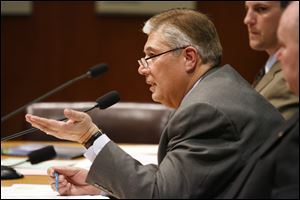
TOLEDO FINANCES
Taxpayers covered bill for top inspector’s daily commute
City reimbursed Zervos $12.99 for round-trip
6/24/2013
Toledo’s director of inspections lives just under a dozen miles from his city hall office downtown, and every gallon of gasoline burned to make that commute has been paid for by taxpayers. Chris Zervos said the expenses are justified because he stops to make inspections on his way to One Government Center and on his way back home to South Toledo.
Toledo’s director of inspections lives just under a dozen miles from his city hall office downtown, and every gallon of gasoline burned to make that commute has been paid for by taxpayers.
Chris Zervos said the expenses are justified because he stops to make inspections on his way to One Government Center and on his way back home to South Toledo.
“Probably since shortly after I became director, since October of 2011,” Mr. Zervos said, referring to the length of time he has been reimbursed $12.99 a day for the commute.
“It wasn’t just reimbursement to and from home, it was use of my personal vehicle because the administration couldn’t afford another vehicle, so I used my own personal vehicle,” he said. “You can’t run an inspection department without being in the field.”
The Bell administration recently stopped the reimbursements and instead gave Mr. Zervos a city-owned 2004 Ford Taurus that is filled with city-purchased gasoline.
The former director of inspections, Bill Brennan, had a city vehicle at his disposal 24 hours a day.
“He was with us for 20 months, and before him it was me, and I had a vehicle available for a part of the time,” Mr. Zervos said. “It has been pretty commonplace for the commissioner or director of inspections to have a vehicle.”
Two weeks of Mr. Zervos’ expense reports obtained by The Blade show he asked to be reimbursed $313.56 for 566 miles driven in his personal vehicle between May 6 and May 15. He asked for $318.91 for 578.8 miles from April 26 to May 3.
A public records request by The Blade for all gas reimbursements to city commissioners and directors since Jan. 1 did not show Mr. Zervos’ reimbursements. City spokesman Jen Sorgenfrei said Mr. Zervos’ reimbursements did not show up in that search of the city’s finance system because he was paid directly on his paycheck. The city could not provide a list by the end of business Friday for any other employees who are paid for gasoline used in personal vehicles.
Deputy Mayor Paul Syring said his predecessor approved Mr. Zervos’ gas reimbursements, and he continued the practice.
“I continued to approve it but was concerned because the cost was sizable, and I have told him to see if he can find a [city] vehicle,” Mr. Syring said.
“Most people don’t have a take-home car, but he is director of inspections, and I consider his office to be all the square miles of the city, and he frequently makes stops to follow up on complaints to and from work.”
Councilman George Sarantou, chairman of council’s finance committee, said it might be time to review who has city vehicles and who is reimbursed for gas.
“I think it is always good periodically to review what the rules are and look into individuals,” Mr. Sarantou said. “If [Mr. Zervos] stops and inspects, then I can expect the charges he is asking to get reimbursed for.”
The use of city vehicles has come under scrutiny in the past.
To help stem the flow of red ink, the Finkbeiner administration in 2008 confiscated city employees’ cell phones, forced some employees to work five days while paying them only for four days, and required those with city-owned vehicles to pay for their own daily commute gasoline costs.
Between 1998 and 2008, the city cut the number of vehicles city employees may take home at night from more than 200 to fewer than 60.
Among those 60 was a leased 2006 silver GMC Envoy that Mr. Finkbeiner used to transport himself and, often, his golden retriever Scout to Government Center downtown.
The city late Friday could not provide an exact list of current take-home vehicles. The police chief, two deputy police chiefs, the police public information officer, the fire chief, assistant fire chief, and three deputy fire chiefs have take-home vehicles.
Other city employees who respond to overnight calls like water main breaks and environmental spills also drive home city-owned vehicles.
Mr. Sarantou said he drives to many city functions but does not ask to be reimbursed.
“City council stopped doing that several years ago when we went into a fiscal crunch,” he said. “We have a $200 expense allowance every month, and I have not used that. Maybe I used it in 2002, but I stopped with many other people to cut costs.”
Other councilmen were surprised to hear about Mr. Zervos’ gas reimbursements and wondered if other high-ranking officials were getting the perk.
“That is not proper,” said Councilman Lindsay Webb. “Ordinary employees in the city are not reimbursed for the trip into the office, so why is Chris Zervos?”
Councilman Joe McNamara — who is opposing incumbent Mayor Mike Bell, Lucas County Auditor Anita Lopez, and Councilman D. Michael Collins and others in the mayor’s election this year — also criticized the expense.
“Getting to and from work should not be covered by the taxpayers,” Mr. McNamara said. “Everyone is responsible to get to work, and take-home vehicles is an issue the city needs to watch to make sure it is not abused.”
Mayor Bell drives his personal car to work.
The mayor came under fire last year for spending $69,000 to buy two sport utility vehicles — a 2013 Chevy Tahoe and a 2011 GMC Terrain — for his staff to use.
Contact Ignazio Messina at: imessina@theblade.com or 419-724-6171.